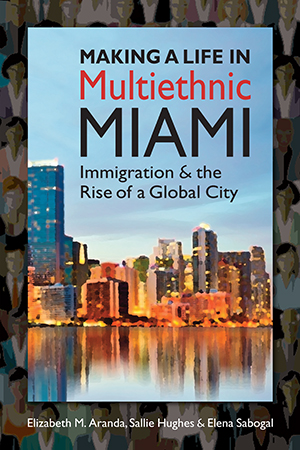Making a Life in Multiethnic Miami:
Immigration and the Rise of a Global City
Elizabeth M. Aranda, Sallie Hughes, and Elena Sabogal
With more than a million immigrants from Latin America and the Caribbean, Miami, Florida, boasts the highest proportion of foreign-born residents of any US city. Charting the rise of Miami as a global city, Elizabeth Aranda, Sallie Hughes, and Elena Sabogal provide a panoramic study of the changing dynamics of the immigration experience.
The authors move easily between an analysis of global currents and personal narratives, examining the many factors that shape the decision to emigrate and the challenges faced in making a new home. Offering a wealth of new insights, their work demonstrates why Miami is such an exceptional laboratory for studying the social forces and local effects of globalization on the ground.
Elizabeth M. Aranda is professor of sociology at the University of South Florida. Sallie Hughes is associate professor of journalism and Latin American studies at the University of Miami. Elena Sabogal is associate professor of women's and gender studies at William Paterson University of New Jersey.
"A methodologically rich and theoretically sophisticated study that vividly contextualizes modern processes of migration and immigrant incorporation."—Maria Aysa-Lastra, Contemporary Sociology
"A groundbreaking [book].... Through its detailed analysis of the US city that includes the largest fraction of foreign-born people among its residents, Making a Life in Multiethnic Miami offers readers a glimpse into the future."—Steven J. Gold, Social Forces
"An important contribution to both the place-specific literature on Miami as well as the wider fields of migration, transnational, and urban studies.... Facilitated by a skillful interweaving of quantitative data sources with participant observation, interviews, and focus-group data.... This book's efforts to disaggregate immigrant experience in [Miami] with attention to national origin, race, class, gender, language ability, and legal status is a refreshing change and much-needed perspective."—Patricia Silver, Centro Voices
"Highly informative.... This book reveals the ethnic and social complexity underlying superficial images.... Making a Life in Multiethnic Miami represents an important contribution to our understanding of the growing phenomenon of transnationalism for individuals, families, and entire communities."—Ronald J. Angel, Ethnic and Racial Studies
"This multidisciplinary text will be indispensable for any serious scholar of immigration…. Essential."—Choice
"A great book…. The authors examine immigrant life at ground level in Miami, a space where global corporate actors from all over the world have a foothold. They find that immigrants' transborder strategies—from community to community, and from home to home—generate a social citizenship."—Saskia Sassen, Columbia University
"A major contribution.... Aranda, Hughes, and Sabogal analyze the "usual suspects" (e.g., so-called push and pull factors, context of reception, etc.), but add entirely new areas of analysis such as ontological security, perceptions of social mobility, racial discrimination and ethnic rivalries, and immigrants' emotional coping strategies. From now on, no serious analyst of immigration can ignore the emotional field. Bravo colegas!"—Eduardo Bonilla-Silva, Duke University
"An extraordinary achievement.... The authors make a significant and welcome addition to the literature on Latinos/as, immigration, citizenship, and gender, race, and class."—Evelyn Nakano Glenn, University of California, Berkeley
"A remarkable intellectual achievement.... With sophisticated insight and comparative empirical evidence, the authors go a long way toward explaining the recent rise of Miami as a global city poised at the edge of North and South America."—Jorge Duany, Florida International University
"A major contribution to our understanding of immigrant incorporation.... The authors provide a theoretically sophisticated and empirically rich account of immigrants who have settled in the diverse global city of Miami."—Peter Kivisto, Augustana College
- Immigration in an Age of Global Insecurity.
- Contexts of Departure.
- The Context of Reception.
- Inequalities and Perceptions of Social Mobility.
- Politics, Membership, and Representation.
- Race, Discrimination, and Ethnic Rivalries.
- Immigrant Emotions and Strategies of Co-Presence.
- Translocal Placemaking and Belonging.
- The Security of Home in a Global Era.







